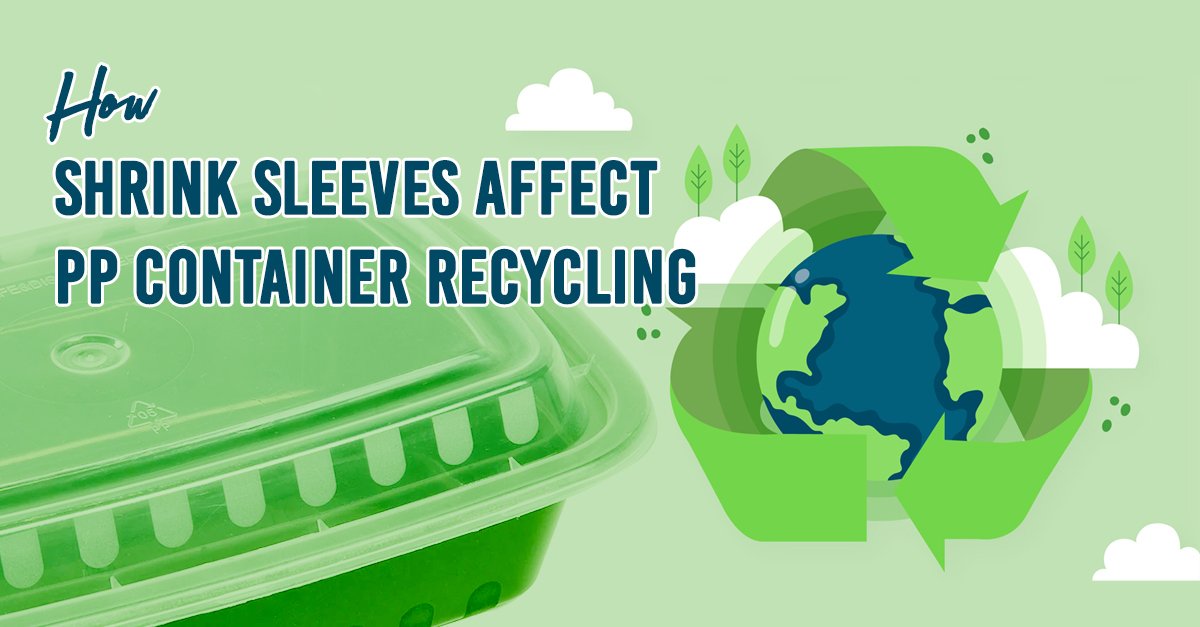How Shrink Sleeves Affect PP Container Recycling

In our previous article, we talked about the effect of shrink sleeves on PET bottle recycling. In this article, let’s look at how PP containers react to recycling when shrink sleeves stay attached to them.
PP or Polypropylene is a type of plastic commonly used to manufacture food containers utilized in packaging takeaway food items and beverages, etc.
Though PP containers are recyclable, certain film substrates interfere with the recycling process if they are left attached to the containers. That’s why businesses must know which shrink films are best for proper recycling and the correct procedures to follow during PP container recycling.
Selection of a Film Substrate
Compatibility: Some sleeve label materials have a density of <1.0 and thus float in the float/sink tank, remaining with the PP. This material cannot be removed during the recycling process. Hence, it can contaminate the recycled PP if not compatible with the PP.
What’s the Solution?
- Films compatible with PP recycling sink in water and can separate from the PP floating in the water. That’s why a preferred choice is to use full bottle sleeve labels specifically crafted for automatic sorting.
- Considering that a full bottle sleeve gets attached to the full surface of the bottle, leaving only a small portion uncovered, we must select a material compatible with automatic sorting, or the sorter machine may segregate the PP bottle with the wrong materials destroying it.
- Also, PVC material needs strict avoidance as even a trace amount can contaminate the reprocessed PP.
Label Inks
The type of ink used on sleeve labels of PP containers also has a bearing on their recyclability.
For example, certain types of label inks bleed during the wash step of the recycling process. If the PP container catches on to the ink color, it becomes discolored, making it even more difficult to salvage the PP and turning it reusable for various intended purposes.
What’s the Solution?
- It is recommended to select inks with the correct density, so they stay on the label during the wash process.
- And do not bleed and mix with the water.
Why Using Pressure-Sensitive PP/PE Labels is Detrimental for PPRecycling?
When recycling a PP container, it is important to know how a certain film substrate will behave in contact with water.
Will the adhesive used to secure the label give away and release the label or will it keep the label held on to the container? In other words, will the label sink or float?
Hence, it is here that testing the adhesives to see how they react becomes crucial. Either the adhesive must be well suited to the PP or it should come off hassle-free during the wash process.
If not, and even the slightest traces of the adhesive stay, it will discolor the recycled PP, spoiling the end result.
Model Specifications – Shrink Sleeve Labels for PP Bottles
According to the Association of Plastic Recyclers (APR), here are the identified characteristics considered compatible with PP recycling –
Full Compatibility: Sleeves PETG with density >1 g/cm³, and with a size that does not hinder the recognition of the underlying PP-polymer.
Limited Compatibility: Sleeves in PVC, PLA, PS (all with density > 1 g/cm³)
Low Compatibility: Sleeves that hinder the recognition of the PP; Sleeves in non-PP-materials with density < 1 g/cm³; Aluminium/Metalised Sleeves; Heavily inked sleeves
CLOSING THOUGHTS
Considering that plastic continues to be frequently used in packaging and requires proper recycling, it is the responsibility of businesses to be conscious about their choices.
The future may see us joining hands with label suppliers who offer recycling-compatible sleeves for their products. But until then, it is on us to do our bit towards a cleaner, safer environment for us and our future generations.
Would you like to get an expert opinion on the best recyclable packaging solutions for your products? Then feel free to book a discovery call with me at www.chetan-jain.com.







